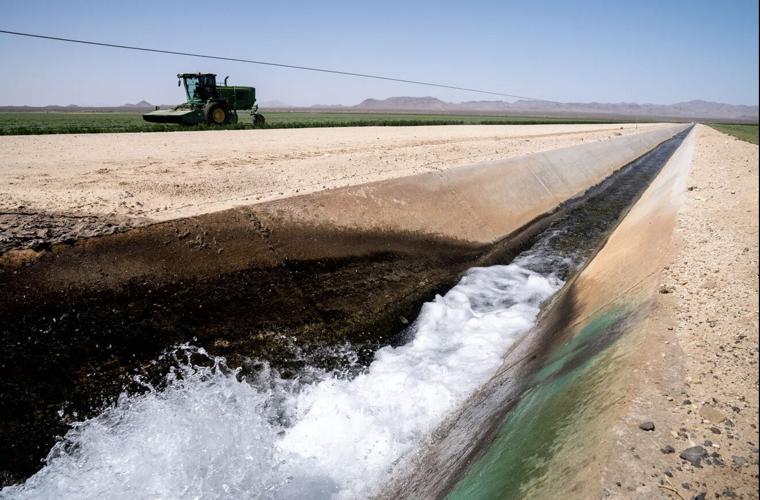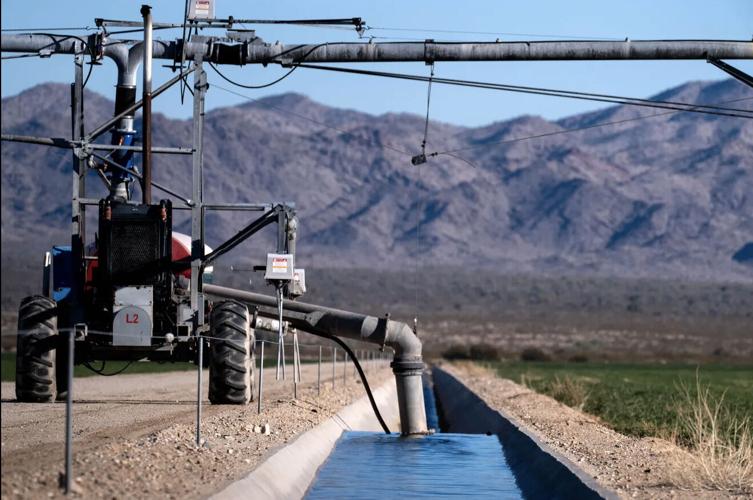Arizona’s auditor general is blasting the state Land Department for leasing land to a Saudi-owned company for below-market rates and not requiring it to pay for — or even report — the amount of groundwater it used.
In an often-scathing special report, Auditor General Lindsey Perry said the department’s policies set the rental rate for farmable land at just half the market retail rental rate.
And that’s just the start. State law requires the department to conduct a mass appraisal of its properties at least once every 10 years to determine its agricultural rental rates. But the last one was done in 2005, Perry said.
More specifically, rental rates were not adjusted over the last 17 years, resulting in incorrect charges that, for just last year, resulted in $3.4 million less in revenues going into the land trust that provides money for K-12 education and other beneficiaries.
Fondomonte was the Saudi company growing alfalfa on state-leased land in western Arizona for dairy cattle in the Middle East. Perry said not only was the company paying below-market rates for the land but the Land Department didn’t require any additional payment for the water it was pumping from the ground.
At one of the company’s farm areas, auditors said Fondomonte was paying $25 an acre this past year. Not only is that lower than the 2005 market rate of $46, but it falls far short of a $125 an-acre figure in a 2018 market rates study, the most recent that was done.
And at another area leased by Fondomonte, the report says Arizona should have been getting $175 an acre based on 2018 rates; the Saudi company was paying just $30 an acre.
Perry also said there were no provisions in the lease to protect water basin levels. Instead, the only requirement on Fondomonte was to “use water in the most efficient manner possible.’’
“However, we found the department did not have a documented process to monitor or ensure its lessees are using water efficiently,’’ Perry reported.
In fact, she noted, some Land Department staffers recommended in 2015 and 2016 that the department should monitor Fondomonte’s water use and should seek the company’s cooperation to install meters on wells and report annual water usage.
“But the department did not implement recommended measures,’’ Perry said.
“Working tirelessly to fix”
In her formal response, Robyn Sahid, tapped by Gov. Katie Hobbs to head the Land Department, said she found no fault with Perry’s report.
As to Fondomonte and the lack of monitoring of water use or ensuring its efficient use, Sahid acknowledged the department has several lease requirements “that lack oversight standards and processes for monitoring and ensuring compliance.’’
“Arizona State Land Department will work to secure resources to ensure that it develops clear, transparent guidelines and expectations for customers, that those guidelines can be implemented and enforced,’’ Sahid wrote.
Hobbs said her administration has been “working tirelessly to fix” what the report found. The governor said it’s a problem she inherited from Doug Ducey, her predecessor.
“It’s clear from this report that the previous administration failed to take action to protect the trust and the beneficiaries by allowing unchecked amounts of groundwater to be pumped on cheap leases that did not deliver market value to our state,’’ Hobbs said in a written statement.
Ducey, through a spokesman, rejected any blame.
“We are proud of the work done by (former) Commissioner (Lisa) Atkins and her staff,’’ Ducey spokesman Daniel Scarpinato said Friday in a prepared statement, though he did not address any specifics in the audit.
“As for the statements from the governor’s office, this seems like little more than eyewash to cover up for being outsmarted by the attorney general on yet another issue,’’ he said.
That is a reference to the fact that it was Arizona Attorney General Kris Mayes who led the charge last year to quash the Fondomonte leases even as Hobbs said she was still exploring options.
Mayes praised the new report.
“She believes it is a travesty that Arizona public school students have been short-changed for the benefit of a foreign corporation,’’ said Mayes’ press aide Richie Taylor.
Leases terminated
At issue are five separate leases of state land in western Arizona to Fondomonte totaling more than 6,608 acres. The company has come under public scrutiny for taking advantage of the fact there is no regulation of groundwater pumping in most rural areas of the state, allowing Fondomonte to pump as much as it wanted without regard to how it affected other landowners in the same basin.
Also raising the ire of some lawmakers is that Fondomonte was growing alfalfa here to feed to cattle in Saudi Arabia because that water-starved county does not permit such farming.
Along with the question of groundwater depletion is the issue of what the company was paying.
That is crucial because the Land Department is charged with obtaining the maximum revenues from the more than 9 million acres of state land it manages. The revenues are allocated to the beneficiaries of the land trust, which include not only K-12 education but also the universities, the Schools for the Deaf and the Blind and the Arizona Department of Corrections, Rehabilitation and Reentry.
A 640-acre lease was canceled in October after the Land Department said the company was in violation of terms because of how it was storing fuel on the site.
Hobbs announced at the same time she would not renew three other leases totaling 2,880 acres when they were set to expire this month. She said the Land Department determined that the leases in the Butler Valley are “not in the best interest of the (land) trust’s beneficiaries due to excessive amounts of water being pumped from the land — free of charge.’’
Those leases, according to the Land Department, were terminated on Feb. 14. The company has until May 14 to remove any improvements and personal property from the parcels.
A fifth lease of 3,088 acres in the Ranegras Plain Basin where Fondomonte grows alfalfa, corn and Bermuda grass is unaffected, with the lease running to 2031.
None of this affects any land the company owns itself or leases from private landowners.
Flawed appraisal process cited
The auditor’s report was generated after a request in November from the Joint Legislative Audit Committee, made up of lawmakers from both parties. Legislators asked Perry’s office to take a closer look at not just the Fondomonte leases but the way the Land Department has been run.
In the detailed report, the auditors found that the practices here for determining rental rates differ from those in other states and do “not fully align with all recommended practices we reviewed.’’
For example, the Land Department uses what it calls a “mass appraisal’’ to determine the value of the land someone seeks to lease. Auditors said that is flawed, as the actual value should be based on looking at each specific property involved.
Of greater concern is that, even with the mass appraisal method, auditors found the Land Department failed to conduct these over a 17-year period despite the legal requirement for reevaluation every 10 years, something that should have occurred in 2015.
“Department staff could not identify a reason why the department did not reappraise its mass appraisals in 2015,’’ the report states.
Auditors said the department did obtain a 2018 study of agricultural market rental rates, which they said showed increases of more than 200% in five farm areas.
“However, as of November 2023, the department had not adjusted its agricultural rental rates since 2006,’’ the report says, adding that the department had no explanation for the lack of an update.
All that comes at a cost.
The state charged about $4.4 million in rent to its 337 active agricultural leases last year, the auditors said.
“However, if the department had updated its agricultural rental rates based on the 2018 market study, which would have increased rates in most of the department’s farm areas, it would have potentially collected approximately $7.8 million during this year,’’ the report states.
Perry said the Land Department does not charge agricultural users for water use based on the premise that water availability is a factor considered in its mass appraisal process. But she said even the Land Department concluded that the value of the water uses on its Butler Valley properties was between $1.2 million and $2.5 million.
Get your morning recap of today's local news and read the full stories here: tucne.ws/morning





